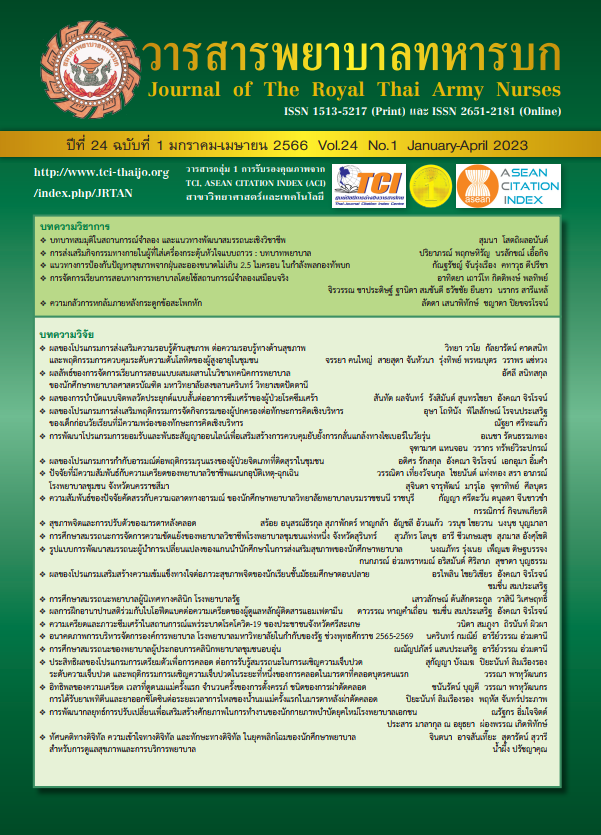Development of Online Acceptance and Commitment Program to Enhance Inhibitory Control on Cyberbullying in Adolescents
Keywords:
Inhibitory Control, Cyberbullying, Acceptance and Commitment ProgramAbstract
The aims of this research are to develop the online acceptance and commitment program to enhance inhibitory control of cyberbullying among adolescents and to test its effectiveness. The sample selected by the cluster sampling consists of sixty junior high school students (12-14 years old) who were currently studying at Banbung Uttasahakamnukhro School, Chonburi, Thailand. The subjects were divided into two groups (experimental and control groups) by using matched pairs of Cyberbullying questionnaire and Barratt Impulsiveness Scale. Each group had thirty students. The research instruments used in the research were Stroop Color and Word Test (SCWT), Barratt Impulsiveness Scale (BIS-11), and Cyberbullying questionnaire (CBQ), and the online acceptance and commitment program to enhance inhibitory control of cyberbullying for adolescents (ACT-ICCB). Data were analyzed by using Repeated-Measures analysis of variance: one between-subject variable and one within-subject variable, and Bonferroni method.
The result showed that the students in the experimental group had a lower level of cyberbullying behaviors in the posttest and the follow-up period than that in the pretest period (p < .05). In addition, the finding revealed that the students in the experimental group had a lower level of cyberbullying behaviors in the posttest and the follow-up period than that in the control group (p < .05).
Downloads
References
Developmental and Behavioral Pediatrics (DBP). Child developmental and behavioral. Vol. 4. Bankok: Developmental and behavioral pediatrics; 2018. (InThai)
Aungabsee J. Developmental Psychology. Bankok: Danex Intercorporation Company Limited; 2018. (InThai)
Lamsupasit S. Theories and Techniques in Behavior Modification. 9th ed. Bangkok: CUpress; 2019. (InThai)
Coutlee CG, Huettel SA. The functional neuroanatomy of decision making: prefrontal control of thought and action. Brain research 2012;1428:3-12.
Erreygers S, Pabian S, Vandebosch H, Baillien E. Helping behavior among adolescent bystanders of cyberbullying: The role of impulsivity. Learning and Individual Differences 2016;48:61-7.
Haenjohn, J. Cognitive psychology. 3rded. Bangkok, Grandpoint; 2019. (In Thai)
Haenjohn, J. Acceptance and commitment therapy.Bangkok, Grandpoint; 2018. (InThai)
Haenjohn, J., Sirithadakunlaphat, S., & Supwirapakorn, W. Development of training on promoting executive functions of the brain in adolescent, Journal of The Royal Thai Army Nurses 2018;19(2): 220-29. (In Thai)
Kumlerd S, Haenjohn J, Sirithadakunlaphat S. Development of Problem Solving Training Program Based on Acceptance and Commitment Therapy in Adolescents and Young Adults with Amphetamine Addiction. Journal of the Royal Thai Army Nurses 2019; 20(1):181-87. (in Thai)
Nusonthara, C., Haenjohn, J., & Sirithadakunlaphat, S. A Development of Cognitive Flexibility Program Based on Acceptance and Commitment Therapy in Primary School Students, Journal of The Royal Thai Army Nurses 2021;22(2):278-285. (In Thai)
Golden CJ, Freshwater SM, Zarabeth G. Stroop Color and Word Test Children’s Version for ages 5-14: A manual for clinical and experimental uses. Stoelting, 2003.
Patton JH, Stanford MS, Barratt ES. Factor structure of the Barratt impulsiveness scale. Journal of clinical psychology 1995;51(6):768-74.
Calvete E, Orue I, Estévez A, Villardón L, Padilla P. Cyberbullying in adolescents: Modalities and aggressors’ profile. Computers in Human Behavior 2010;26(5):1128-35.
Kongsonthana A. Acceptance and Commitment Therapy (ACT) for Adolescent and Application in COVID-19 Outbreak: A Literature Review. Journal of The Department of Medical Services 2021;46(2):159-65. (InThai)
Oberle E, Schonert-Reichl KA, Lawlor MS, Thomson KC. Mindfulness and inhibitory control in early adolescence. The Journal of Early Adolescence. 2012;32(4):565-88
Amiri S, Ehtesham Zadeh P, Hafezi F, Borna MR. Comparison of the Effectiveness Behavioral Activation Treatment Therapy and Acceptance and Commitment Therapy on Executive Functions of Learning the Rules, Inhibiting Impulsivity, and Flexibility in Patients with Depression. The Neuroscience Journal of Shefaye Khatam 2021;9(2):68-78.
Yaselyani M. The Effectiveness of Acceptance and Commitment-Based Therapy on Mood Regulation, Executive Function and Reduction of Behavioral Symptoms, After Cessation of Drug Use in Maintenance Therapies. International Journal of Medical Investigation 2021;10(4).
Yuan G, Liu Z. Longitudinal cross-lagged analyses between cyberbullying perpetration, mindfulness, and depression among Chinese high school students. Journal of health psychology 2021;26(11):1872-81.
Emirtekin E, Balta S, Kircaburun K, Griffiths MD. Childhood emotional abuse and cyberbullying perpetration among adolescents: The mediating role of trait mindfulness. International Journal of Mental Health and Addiction 2020;18(6):1548-59.
Sun X, Chen L, Wang Y, Li Y. The link between childhood psychological maltreatment and cyberbullying perpetration attitudes among undergraduates: Testing the risk and protective factors. PLoS one 2020;15(9):1-5.
Boduch EM. An Evaluation of a Brief Mindfulness and Values Training on Cyber Bullying Behavior in College Students. Mankato: Cornerstone Minnesota State University; 2020.
Tupsai U, Hongsiri Y. The online learning during the covid-19 pandemic of foreign language department at Anubanloei school, Loei province. Integrated Social Science Journal 2022;2(4):49-55. (InThai)
Downloads
Published
How to Cite
Issue
Section
License
Copyright (c) 2023 Journal of The Royal Thai Army Nurses

This work is licensed under a Creative Commons Attribution-NonCommercial-NoDerivatives 4.0 International License.
บทความหรือข้อคิดเห็นใดใดที่ปรากฏในวารสารพยาบาลทหารบกเป็นวรรณกรรมของผู้เขียน ซึ่งบรรณาธิการหรือสมาคมพยาบาลทหารบก ไม่จำเป็นต้องเห็นด้วย
บทความที่ได้รับการตีพิมพ์เป็นลิขสิทธิ์ของวารสารพยาบาลทหารบก
The ideas and opinions expressed in the Journal of The Royal Thai Army Nurses are those of the authors and not necessarily those
of the editor or Royal Thai Army Nurses Association.






